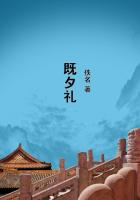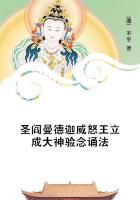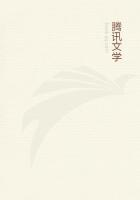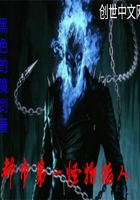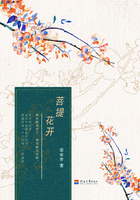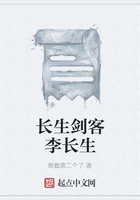A paddle lay on the sand just above the water mark. "That never floated there." He leaped out and drew up his canoe, then, dropping on his knees, he examined the marks upon the bar. There on the sand was stamped the print of an open hand. "Now, God be thanked!" he cried, lifting his hands toward the sky, "he's reached this spot. He's somewhere on shore here." Like a dog on scent he followed up the marks to the edge of the forest where the bank rose steeply over rough rocks. Eagerly he clambered up, his eyes on the alert for any sign. He reached the top. A quick glance he threw around him, then with a low cry he rushed forward. There, stretched prone on the moss, a little pile of brushwood near him, with his match case in his hand, lay his brother. "Oh, ****, boy!" he cried aloud, "not too late, surely!" He dropped beside the still form, turned him gently over and laid his hand upon his heart. "Too late! Too late!" he groaned. Like a madman he rushed out of the woods, flung himself down the rocky bank and toward his canoe, seized his bag and scrambled back again. Again, and more carefully, he felt for the heartbeat. He thought he could detect a feeble flutter. Hurriedly he seized his flask and, forcing open the closed teeth, poured a few drops of the whiskey down the throat. But there was no attempt to swallow. "We'll try it this way." With swift fingers he filled his syringe with the whiskey and injected it into the arm. Eagerly he waited with his hand upon the feebly fluttering heart. "My God! it's coming, I do believe!" he cried. "Now a little strychnine," he whispered. "There, that ought to help."
Once more he rushed to his canoe and brought his cooking kit and blanket. In five minutes he had a fire going and his tea pail swung over it with a little more than a cupful of water in it. In five minutes more he had half a cup of hot tea ready. By this time the heartbeat could be detected every moment growing stronger.
Into the tea he poured a little of the stimulant. "If I can only get this down," he muttered, chafing at the limp hands. Once more he lifted the head, pried open the shut jaws, and tried to pour a few drops of the liquid down. After repeated attempts he succeeded.
Then for the first time he observed that his hands were covered with blood. Gently he lifted the head and, examining the back of it, detected a great jagged wound. "Looks bad, bad." He felt the bone carefully and shook his head. "Fracture, I fear." Heating some more water he cleansed and dressed the wound. Half an hour more he spent in his anxious struggle, with intense activity utilizing every precious moment, when to his infinite joy and relief the life began to come slowly back. "Now I must get him to the hospital."
There were still five miles to paddle, but it was down stream and there were no portages. With swift despatch he cut a large armful of balsam boughs. With these and his blankets he made a bed in his canoe, cutting out the bow thwart, then lifting the wounded man and picking his steps with great care, he carried him to the canoe and laid him upon the balsam boughs on his right side. The moment the weight came upon that side a groan burst from the pallid lips.
"Something wrong there," muttered the doctor, turning him slightly over. "Ah, shoulder out. I'll just settle this right now." By dexterous manipulation the dislocation was reduced, and at once the patient sank down upon the bed of boughs and lay quite still. A little further stimulation brought back the heart to a steadier beat. "Now, my boy," he said to himself, as he took his place kneeling in the stern of the canoe, "give her every ounce you have." For half an hour without pause, except twice to give his patient stimulant, the sweeping paddle and the swaying body kept their rhythmic swing, till down the last riffle shot the canoe and in a minute more was at the Landing.
"Duprez! Here, quick!" The doctor stood in the door of the stopping place, wet as if he had come from the river, his voice raucous and his face white.
"Mon Dieu!" exclaimed the Frenchman, "what de mattaire?"
The doctor swept a glance about the room. "Sick man," he said briefly. "I want this bed. Get your buckboard, quick." He seized the bed and carried it out before the eyes of the astonished Duprez.
Duprez was a man slow of speech but quick to act, and by the time the bed had been arranged on the buckboard he had his horse between the shafts.
"Now then, Duprez, give me a hand," said the doctor.
"Certainment. Bon Dieu! Dat's de bon preechere! Not dead, heh?"
"No," said the doctor, glancing sharply into the haggard face while he placed his fingers upon the pulse. "No. Now get on. Drive carefully, but make time."
In a few minutes they reached the road that led to the hospital, which was well graded and smooth. Duprez sent along his pony at a lope and in a short space of time they reached the door of the hospital, where they were met by Orderly Ben Fallows on duty.
"Barney! By the livin' jumpin' Jemima Jebbs!" cried Ben. "What on earth--"
But the doctor cut him short. "Ben, get the Matron, quick, and get a bed ready with warm blankets and hot water bottles. Go, man!
Don't gape there!"
Still gaping his amazement, Ben skipped in through the hall and up the stair as fast as his wooden leg would allow him. He reached the office door. "Miss Margaret," he gasped, "Barney's at the door with a sick man. Wants a bed ready. We 'aven't got one--and--"
The look upon the matron's face interrupted the flow of his words.
"Barney?" she said, rising slowly to her feet. "Barney?" she said again, her hand clutching the desk and holding hard. "What do you mean, Ben?" The words came slowly.
"He wants a bed for a sick man and we 'aven't--"
Margaret took a step toward him. "Ben," she said, in breathless haste, "get my room ready. But first tell Nurse Crane to come to me quick. Go, Ben."

